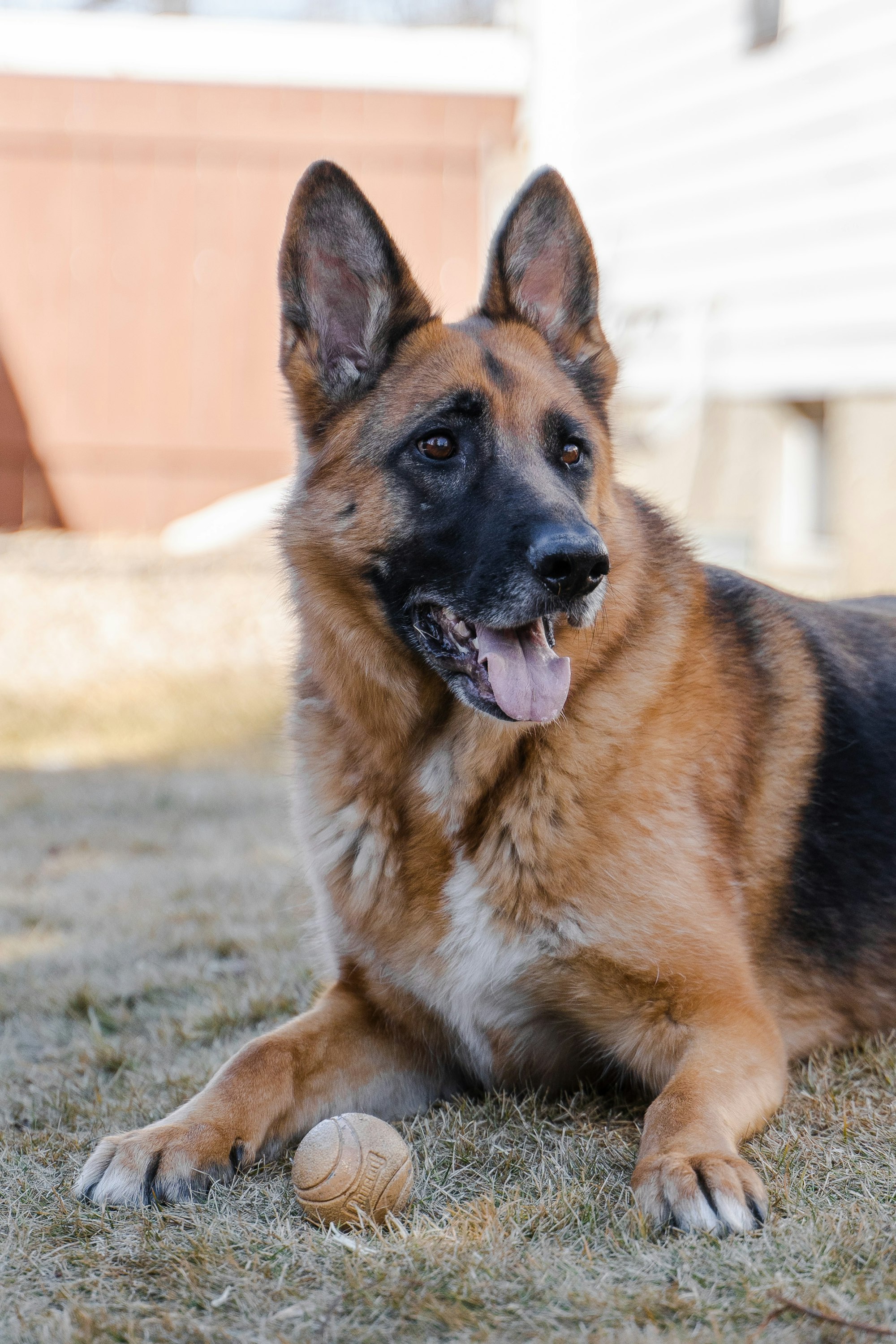German Shepherds are a breed of dog that require a high-quality diet to maintain their energy levels and overall health. As puppies, they have specific nutritional needs that must be met to ensure proper growth and development. Choosing the right food for your German Shepherd puppy can be overwhelming, but with a little knowledge, you can make an informed decision.
Understanding German Shepherd Puppy Nutritional Needs is crucial when selecting the right food for your furry friend. German Shepherd puppies require a diet that is high in protein, fat, and calories to support their growing bodies. They also need a balance of vitamins and minerals to ensure their bones and muscles develop properly. It's important to choose a food that is specifically formulated for puppies to ensure they receive the right balance of nutrients.
Key Takeaways
- German Shepherd puppies require a high-quality diet to support their growth and development.
- A diet high in protein, fat, and calories is necessary for German Shepherd puppies.
- Choosing a food that is specifically formulated for puppies is important to ensure they receive the right balance of nutrients.
Understanding German Shepherd Puppy Nutritional Needs
German Shepherd puppies require a well-balanced diet to support their growth and development. A balanced diet should provide the necessary nutrients, vitamins, and minerals for optimal growth and development.
Protein and Energy Requirements
Protein is an essential nutrient for German Shepherd puppies. It is required for muscle growth, repair, and maintenance. A high-quality protein source such as chicken, beef, or lamb should be included in their diet. The protein content should be at least 22% of the total calories consumed.
Energy is also an important factor in a puppy's diet. They require more calories than adult dogs to support their growth and development. The calorie content should be carefully monitored to prevent overfeeding and obesity.
Vitamins and Minerals for Optimal Growth
Vitamins and minerals are essential for a puppy's overall health and well-being. Vitamin A is important for vision, immune function, and skin health. Vitamin D is necessary for bone growth and calcium absorption. Vitamin E is an antioxidant that protects against cell damage.
Minerals such as calcium, phosphorus, and magnesium are important for bone growth and development. Iron is necessary for the production of red blood cells, and zinc is important for immune function and wound healing.
A well-balanced diet should include all the essential vitamins and minerals. Amino acids are also important for muscle growth and repair.
In conclusion, German Shepherd puppies have specific nutritional needs to support their growth and development. A balanced diet that includes high-quality protein, appropriate calorie content, and essential vitamins and minerals is essential. A veterinarian or animal nutritionist can provide guidance on the appropriate diet for your puppy.
Top Recommended Puppy Foods for German Shepherds
German Shepherd puppies require a balanced and nutritious diet to grow into healthy adult dogs. Here are some of the top recommended puppy foods for German Shepherds:
High-Quality Protein Sources
Protein is an essential nutrient for all dogs, and German Shepherds are no exception. High-quality protein sources such as chicken, lamb, turkey, and beef are excellent options for German Shepherd puppies. Look for puppy foods that list these protein sources as the main ingredients.
Specialized Large Breed Puppy Food
German Shepherds are a large breed, and they have specific nutritional requirements that differ from smaller breeds. Large breed puppy food is specially formulated to meet the needs of growing large breed puppies. Look for puppy foods that are labeled as ""large breed"" and have appropriate levels of protein, fat, and calories.
When choosing a puppy food for your German Shepherd, it's important to read the label and choose a high-quality brand that meets their nutritional needs. Consult with your veterinarian to determine the best diet for your puppy.
Feeding Your German Shepherd Puppy for Optimal Health
When it comes to feeding your German Shepherd puppy, it's essential to provide them with a balanced diet that promotes optimal health. Here are some tips to help you ensure your puppy gets the nutrients they need to grow and thrive.
Balanced Diet and Portion Control
A balanced diet is crucial for your German Shepherd puppy's health. They require a diet that is high in protein, fat, and carbohydrates to support their active lifestyle. It's essential to feed them a diet that is specifically formulated for puppies to ensure they get the right balance of nutrients.

Portion control is also important to prevent overfeeding, which can lead to obesity and other health problems. Follow the feeding guidelines on the puppy food packaging and adjust the portions based on your puppy's age, weight, and activity level.
Avoiding Foods That Are Harmful to Puppies
Certain foods can be harmful to your German Shepherd puppy's health and should be avoided. For example, puppies have sensitive digestive systems, so it's best to avoid foods that are high in corn or wheat, which can be difficult to digest.
Grain-free dog food is a popular choice for many pet owners, but it's important to note that not all grain-free foods are created equal. Some grain-free dog foods may contain high levels of legumes and potatoes, which can be harmful to your puppy's health.
It's also important to avoid feeding your puppy bones, as they can splinter and cause choking or intestinal blockages. Additionally, avoid feeding your puppy table scraps, as they can be high in fat and salt, which can lead to digestive issues and obesity.
By providing your German Shepherd puppy with a balanced diet and avoiding foods that are harmful to their health, you can help ensure they grow up to be healthy and happy dogs.
The Role of Supplements in a Puppy's Diet
German Shepherd puppies require a balanced and nutrient-rich diet to grow and develop properly. While a well-rounded diet is essential, supplements can also play a crucial role in ensuring the puppy's overall health and well-being.
Probiotics and Prebiotics for Digestive Health
Probiotics and prebiotics are beneficial bacteria and fibers, respectively, that can aid in the digestion and absorption of nutrients. These supplements can help maintain a healthy balance of gut flora and prevent digestive issues such as diarrhea and constipation.
When selecting a probiotic or prebiotic supplement for a German Shepherd puppy, it is important to choose a product that is specifically formulated for dogs and contains strains of bacteria that are beneficial for their digestive system.
Joint Health Supplements
As German Shepherds are prone to joint issues such as hip dysplasia, joint health supplements can be beneficial in promoting healthy joints and preventing future problems. Glucosamine and chondroitin are commonly used supplements that can help maintain joint health and reduce inflammation.
It is important to note that joint supplements should not be used as a replacement for proper exercise and nutrition. A well-rounded diet and regular exercise are essential for maintaining a puppy's overall health and preventing joint issues.
Omega Fatty Acids for Overall Health
Omega fatty acids, particularly omega-3s, are essential for a puppy's overall health and well-being. These fatty acids can aid in brain development, improve skin and coat health, and reduce inflammation.
Supplements such as fish oil or flaxseed oil can be added to a puppy's diet to ensure they are receiving adequate amounts of omega-3s. It is important to consult with a veterinarian before introducing any new supplements to a puppy's diet.
In conclusion, supplements can be a valuable addition to a German Shepherd puppy's diet when used properly and in conjunction with a well-rounded diet and regular exercise. Probiotics and prebiotics can aid in digestive health, joint supplements can promote healthy joints, and omega fatty acids can improve overall health and well-being.
Choosing the Right Dog Food Brand
When it comes to choosing the right dog food brand for a German Shepherd puppy, there are a few important factors to consider. Analyzing the ingredient quality and deciphering dog food labels are two key aspects that can help pet owners make an informed decision.
Analyzing Ingredient Quality
One of the most important things to consider when choosing a dog food brand is the quality of the ingredients used. Look for brands that use high-quality protein sources, such as chicken, beef, or fish. Additionally, the food should contain healthy fats and carbohydrates, such as brown rice or sweet potatoes.
Some of the best overall dog food brands for German Shepherd puppies include Blue Buffalo, Royal Canin, Iams Proactive Health, Purina Pro Plan, and Taste of the Wild. These brands use quality ingredients and do not contain artificial colors or flavors.
Deciphering Dog Food Labels
Dog food labels can be confusing, but understanding them is crucial when choosing the right brand for a puppy. Look for labels that list the protein source as the first ingredient, and avoid brands that use fillers such as corn or wheat.
It is also important to pay attention to any artificial preservatives, colors, or flavors used in the food. These can be harmful to a puppy's health and should be avoided.
By analyzing ingredient quality and deciphering dog food labels, pet owners can make an informed decision when choosing the best food for their German Shepherd puppy.
Special Considerations for German Shepherd Puppies
German Shepherd puppies have specific dietary needs that must be met to support their growth and development. It is important to choose a high-quality puppy food that meets their nutritional requirements. Here are some special considerations to keep in mind when selecting food for your German Shepherd puppy.

Managing Food Allergies and Sensitivities
German Shepherd puppies are prone to food allergies and sensitivities, which can cause digestive issues and skin problems. To avoid these issues, it is important to select a puppy food that is free from common allergens such as soy, wheat, and corn. Additionally, some puppies may require a diet that is free from certain animal proteins, such as chicken or beef.
If you suspect that your puppy has a food allergy or sensitivity, it is important to consult with your veterinarian. They may recommend an elimination diet to identify the specific allergen or sensitivity. In some cases, your veterinarian may recommend a prescription diet or a hypoallergenic diet.
Supporting Skin and Coat Health
German Shepherds have a thick double coat that requires regular grooming to maintain its health and shine. The right diet can also help support skin and coat health. Look for a puppy food that contains essential fatty acids such as arachidonic acid (ARA), docosahexaenoic acid (DHA), and omega-3s. These fatty acids help maintain healthy skin and a shiny coat.
Additionally, vitamin E is an important nutrient for skin health. It is a powerful antioxidant that helps protect the skin from damage caused by free radicals. Look for a puppy food that contains vitamin E to support your German Shepherd puppy's skin health.
In summary, selecting the right food for your German Shepherd puppy is crucial to support their growth and development. Be sure to choose a high-quality puppy food that meets their nutritional needs and take special considerations into account such as food allergies and sensitivities, as well as skin and coat health. Consult with your veterinarian if you have any concerns about your puppy's diet.
Transitioning from Puppy Food to Adult Food
As German Shepherd puppies grow, their nutritional needs change, and they require a different diet to support their development into adulthood. Transitioning from puppy food to adult food is a critical process that should be done gradually to avoid digestive issues.
When and How to Switch Foods
The transition from puppy food to adult food should begin when the German Shepherd puppy is around 12 months old. Large-breed dogs like German Shepherds take longer to reach full maturity, so it's essential to switch to adult food at the right time to ensure proper nutrition.
To begin the transition, start by mixing a small amount of adult food with the puppy's current food. Gradually increase the amount of adult food while decreasing the puppy food over the course of a week or two until the puppy is eating only adult food.
It's important to choose a high-quality adult food that is specifically formulated for large-breed dogs like German Shepherds. Look for a food that contains high-quality protein sources and essential nutrients like omega-3 fatty acids, calcium, and phosphorus.
In conclusion, transitioning from puppy food to adult food is an important step in a German Shepherd puppy's development. By doing it gradually and choosing the right food, owners can ensure that their puppy receives the proper nutrition to support their growth and development into a healthy adult German Shepherd.
Consulting with Veterinarians for Personalized Advice
When it comes to feeding a German Shepherd puppy, it is always best to consult with a veterinarian for personalized advice. They can provide crucial information about the puppy's nutritional needs and recommend the best food options based on their health, age, and activity level.
Regular Check-Ups and Diet Adjustments
Regular check-ups with a veterinarian are essential to ensure that the puppy is growing and developing properly. During these check-ups, the vet can monitor the puppy's weight, body condition, and overall health. They can also make necessary diet adjustments based on the puppy's changing needs.
When consulting with a veterinarian, it is important to ask about the safety and quality of different brands of puppy food. Brands like Holistic Select, Nutro Ultra, and Nutro Wholesome Essentials are often recommended by veterinarians for their high-quality ingredients and balanced nutrition. Purina One SmartBlend is another popular option that provides essential nutrients for a growing puppy.
Overall, consulting with a veterinarian can provide invaluable guidance on the best food options for a German Shepherd puppy. They can help ensure that the puppy receives the proper nutrition for optimal growth and development.

Frequently Asked Questions
What are the recommended dog food brands for German Shepherd puppies?
There are several dog food brands that are recommended for German Shepherd puppies, including Royal Canin, Hill's Science Diet, and Blue Buffalo. It is important to choose a high-quality dog food that is specifically formulated for large-breed puppies to ensure that they receive the proper nutrition they need to grow and develop.
How much food should a German Shepherd puppy eat based on its weight?
The amount of food a German Shepherd puppy should eat depends on its weight. As a general rule, puppies should eat about 2-3% of their body weight in food each day. However, it is important to consult with a veterinarian to determine the exact amount of food your puppy needs based on its individual needs and activity level.
What are the best wet food options for a German Shepherd puppy?
Wet food can be a great addition to a German Shepherd puppy's diet, as it can provide additional moisture and flavor. Some of the best wet food options for German Shepherd puppies include Merrick Grain-Free Puppy Plate, Blue Buffalo Homestyle Recipe Puppy Chicken Dinner, and Hill's Science Diet Puppy Savory Stew.
What ingredients should be avoided in food for German Shepherds with allergies?
German Shepherds can be prone to food allergies, so it is important to choose a dog food that is free from common allergens such as wheat, soy, and corn. Additionally, some dogs may be allergic to specific proteins such as chicken or beef, so it is important to choose a dog food that is free from these ingredients if your dog has a known allergy.
What is the optimal feeding schedule for a German Shepherd puppy?
German Shepherd puppies should be fed three to four small meals per day until they are about six months old. After six months, they can be transitioned to two meals per day. It is important to establish a consistent feeding schedule to help prevent digestive upset and promote healthy growth and development.
Are there any foods that are particularly harmful to German Shepherds?
There are several foods that can be harmful to German Shepherds, including chocolate, grapes, raisins, onions, and garlic. Additionally, it is important to avoid feeding your dog table scraps and to keep any toxic substances, such as cleaning products or medications, out of reach.